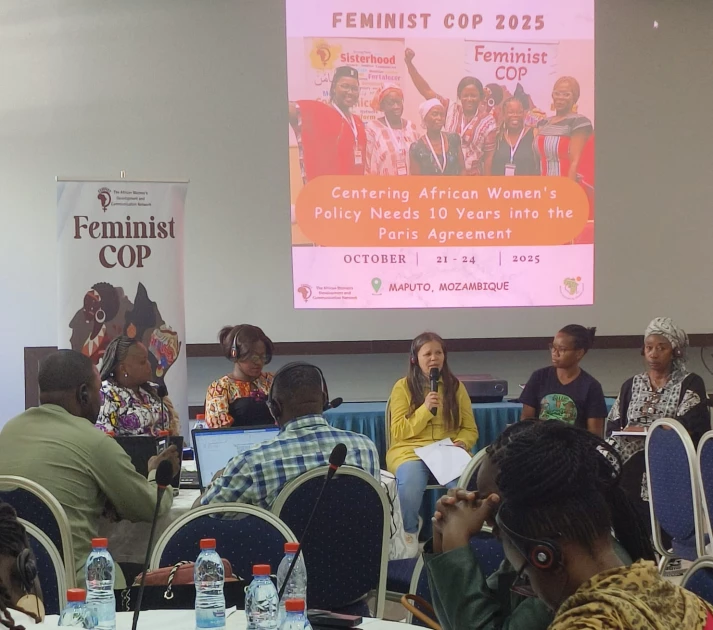Revisiting Climate Change gender policies a decade into the Paris Agreement


Audio By Vocalize
The sharp rhythmic sound of a clock ticking is clearly sinking into the ears of climate change stakeholders; Belém, Brazil, is calling loudly for the November 2025 United Nations Conference of the Parties on Climate Change (COP30).
A few days to the 30th global climate change convening, it is evident that the past has piled up and hopes for the future are receding, decreasing optimism for the possibility of new, implementable policies. This mounting pressure and anxiety among feminists stands in contrast to the relative indifference of climate policy implementers who are not directly facing the real wrath of the climate crisis.
Maputo,
Mozambique, is playing host to the Africa Feminists Climate Change COP 2025 — a
precursor to the United Nations Framework Convention on Climate Change
(UNFCCC). The forum aims to take stock of the hits and misses of the Paris
Agreement policies a decade on, under the theme “Centring African Women’s Policy Needs 10
Years into the Paris Agreement.”
In her
welcoming remarks at the Feminists’ COP in Maputo, where Kenya is well
represented, Madam Luisa Mboana, President of the Women, Law and Development
(MULEIDE) and host of the event, noted that gender consideration at the UNFCCC
decision-making table remains a thorn in the flesh.
“We face
obstacles, but with courage and unity, we overcome them. Ten years into the
Paris Agreement on climate change, women are becoming more vulnerable to
climate disasters. We must emphasize knowledge and women’s experiences in
climate crisis solutions. A theme that unites us is gender equality —
emphasizing values of equality, the fight against gender-based violence, and
commitment to climate resilience,” she said.
The Maputo
COP emphasises the vision of a society where African women and girls thrive in
dignity and well-being, free from patriarchal and neoliberal oppression and
injustices, including climate injustices.
Addressing
the conference delegation, Ann Tek, the Climate Justice Coordinator at the
African Women’s Development and Communication Network (FEMNET), said:
“It is
unfortunate that a decade into the Paris Agreement, we meet not to celebrate
but to confront failed implementations. Women and children in Sub-Saharan
Africa continue to experience gendered crises in climate injustices. Women rely
on agriculture to sustain their families but remain without substantive
support. It is sad that in global climate finance, only 2% is allocated to
African women. The Feminists’ COP in Maputo seeks to reclaim that voice and power.”
It also
emerged that women's rights organizations across Africa face a cruel paradox:
they work closest to communities experiencing climate impacts and have
developed the most contextually appropriate solutions, yet they lack meaningful
representation in climate decision-making processes and do not have access to
the resources they need to continue and scale their work.
At COP28, for
instance, only 34% of Party delegates were women, and less than one in five
Heads of Delegation (19%) was female. At COP27, women comprised only 20% of
Heads of Delegation, and in some countries, men accounted for up to 90% of the
delegations. This systemic exclusion reflects broader patterns of
marginalization.
Voices at the
COP suggested that the current climate governance system perpetuates
colonial-era approaches that prioritize external solutions over African-led
innovations, undermining community ownership, impact, and sustainable
development.
Mr. Abel
Neves, representing the African Youth Commission – Mozambique Chapter,
highlighted various levels of climate vulnerability, singling out the
disproportionate impact of climate change on women and children. He warned
against creating a climate justice vision without inclusion.
Michael
Dhantemwa, African Activists for Climate Justice (AACJ) Project Lead at OXFAM,
added:
“It is
unfortunate that people from the grassroots have no say in the outcomes of
climate change convenings. Here in Maputo-Matola, for example, we see women
pushing themselves to develop climate solutions despite a lack of resources. We
must move beyond paperwork and promises and focus on how these women can access
adaptation finance beyond rhetoric.”
The
gathering, however, acknowledged a number of advancements since the adoption of
the Paris Agreement, outlining both achievements and persistent challenges.
“To this day,
we have witnessed mixed progress. For example, despite growth in renewable
energy, there remains an overreliance on fossil fuels. There has been global
recognition of climate justice and equity campaigns and increased climate
finance, although uneven. The climate finance gap remains huge when comparing
promises to actual delivery,” reiterated Dr. Mela Chiponda.
Cleopatra
Phiri-Hurungo, UNDP Gender Team Lead for Africa, emphasized the need to remain
true to the women at the local level whom international delegates claim to
represent, urging leaders to avoid irony in representation agendas.
“Let’s not
drown in titles. Instead, let us advance the agenda of African women and girls
by focusing on their lived realities,” she urged.
Grace Alupo, AACJ Coordinator, emphasized: “Women, children, and indigenous groups are the most affected by shrinking financial commitments. This is an opportunity for us to push for a people-centered course that puts gender equality at the forefront.”
The 2015
Paris Agreement, a framework for climate justice, has the overarching goal of
universally limiting global warming to well below 2°C — ideally 1.5°C — above
pre-industrial levels. It is a binding agreement that unites UNFCCC member
nations in the fight against the climate crisis and in adaptation to its
effects.
The convening by various feminist groups, partners, and climate stakeholders across Africa seeks to provide a dedicated brainstorming space for insights centered on African feminist perspectives in climate justice and policy.
It aims to co-create transformative policy demands on the Gender Action Plan, attainable climate finance, and gender-just transitions, with a focus on strengthening broad-based coalitions that will influence COP30 outcomes in Brazil.


Leave a Comment